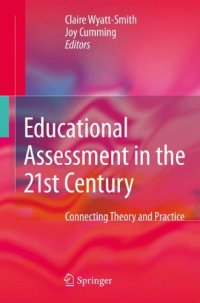
Ebook: Educational Assessment in the 21st Century: Connecting Theory and Practice
Author: J. Joy Cumming Claire Wyatt-Smith (auth.) Prof. Claire Wyatt-Smith Prof. J. Joy Cumming (eds.)
- Tags: Assessment Testing and Evaluation, Educational Policy and Politics, Sociology of Education, Learning & Instruction
- Year: 2009
- Publisher: Springer Netherlands
- Edition: 1
- Language: English
- pdf
Even in the white heat of the ever-present education debate, assessment is one of the hottest and most contested topics. While teachers develop practical methodologies such as Assessment for Learning, that aim to bring positive benefits to learners, governments and policy-makers strengthen the role of externally mandated assessment for accountability purposes.
With the field of assessment a key focus for research the world over, the traditional issues of the topic, such as validity and reliability, have been joined by a host of other issues all pressing for attention. These include: the value of testing for international benchmarking and public reporting; taking account of cultural and social diversity; new modes of testing and assessment; technological innovation; the issue of what counts as authentic assessment; and inclusion and disability issues in assessment.
In their preface, the editors argue that in a post-modern world changes in the nature of work, globalization, the information revolution and today’s social challenges will all impact on educational priorities, and thus will require new modes of assessment. As our faith in the sciences to solve our problems erodes, we also recognize that the educational assessment cannot be an exact science either; that the involvement of human beings in every aspect of its design, execution and use makes it irrevocably a social project and thus subject to all the vagaries that any kind of human activity implies. This has led to the beginnings of a more humanistic approach to assessment.
As this book makes clear, the challenge for assessment in the 21st century will be to reflect these newly emerging educational priorities. Assessment procedures will be needed that support the next generation in acquiring the skills and values they will need to manage emerging global challenges, skills such as teamwork, problem-solving and the ability to manage one’s own learning. The contributors here offer hope, suggesting that after more than a century of modernist-inspired educational assessment practices inimical to the issues of utility, fairness, flexibility and relevance, we may well be standing at the threshold of significant change.
This book will examine educational assessment in the rapidly changing and global world of the 21st century. Assessment has always been a key focus of educational policy, research and practice throughout the world, with the field often represented as contested. While traditional issues of validity and reliability continue to have high salience, there is a myriad of issues that are also pressing for educational assessment on the international scene. These include: assessment, the law and accountability; the value of testing for international benchmarking and public reporting; assessment practices that take account of cultural and social diversity; assessment practices that go beyond traditional paper and pencil tests to include other modes; assessment and technological innovation; the matter of what counts as authentic assessment, especially in relation to professional and vocational education; and, assessment issues relating to inclusion and disabilities. Two major factors have informed this book. First, it has arisen from the clear and growing press for education accountability and measurement initiatives, reflected in the prominence given in many countries throughout the world to large-scale testing and reporting initiatives. This is not a stand-alone force, however, in the education and assessment fields. Also evident are strong moves in some countries to endorse alternative modes of assessment beyond traditional pencil and paper tests, and in developing teachers’ assessment capabilities. These radically different directions in research inevitably make competing demands on education researchers, as well as those involved in policy and practice. It is timely therefore for a book to bring together cutting edge research papers and theoretical papers that open out and explore the ways forward for assessment in a new century characterised by an unprecedented change and growth in knowledge. Second, in our previous research and publications, we have applied a multidisciplinary and multitheoretical approach in our work. Our aim for this book is for it to be encompassing of different disciplines that will inform the methodologies and approaches underlying different theoretical understandings about assessment. A multitheoretical approach to education research has been previously advocated (see Beach, Green, Kamil and Shanahan, 1991, and more recently, Green, Camilli and Elmore, 2006). Further, Cumming and Wyatt-Smith (2001) have previously adopted such an approach in a book on literacy education in the post-compulsory years of schooling. The proposed book would be the first time a multitheoretical approach to assessment has been explored. We believe that the value and need for such an approach is pressing in the field of assessment. The underlying position of this book is that the field of assessment research needs to move beyond the old notions of assessment for measurement and assessment learning, such notions working in part to maintain the longstanding distinction between objectivity and subjectivity. Instead, the field of assessment can now be characterised in terms of the myriad of 21st century issues that confront it and that call for public and scholarly scrutiny and discussion. The focus on assessment in the book will be to situate assessment in contexts and the research, policy and practice nexus for assessment in the 21st century, with impacts of changes such as technology, inclusive practices, cultural diversity, and learning for the workplace as well as accountability-driven reform. Individual authors will focus on contexts of, and purposes for, and practices in assessment using their preferred theoretical or paradigmatic approach.